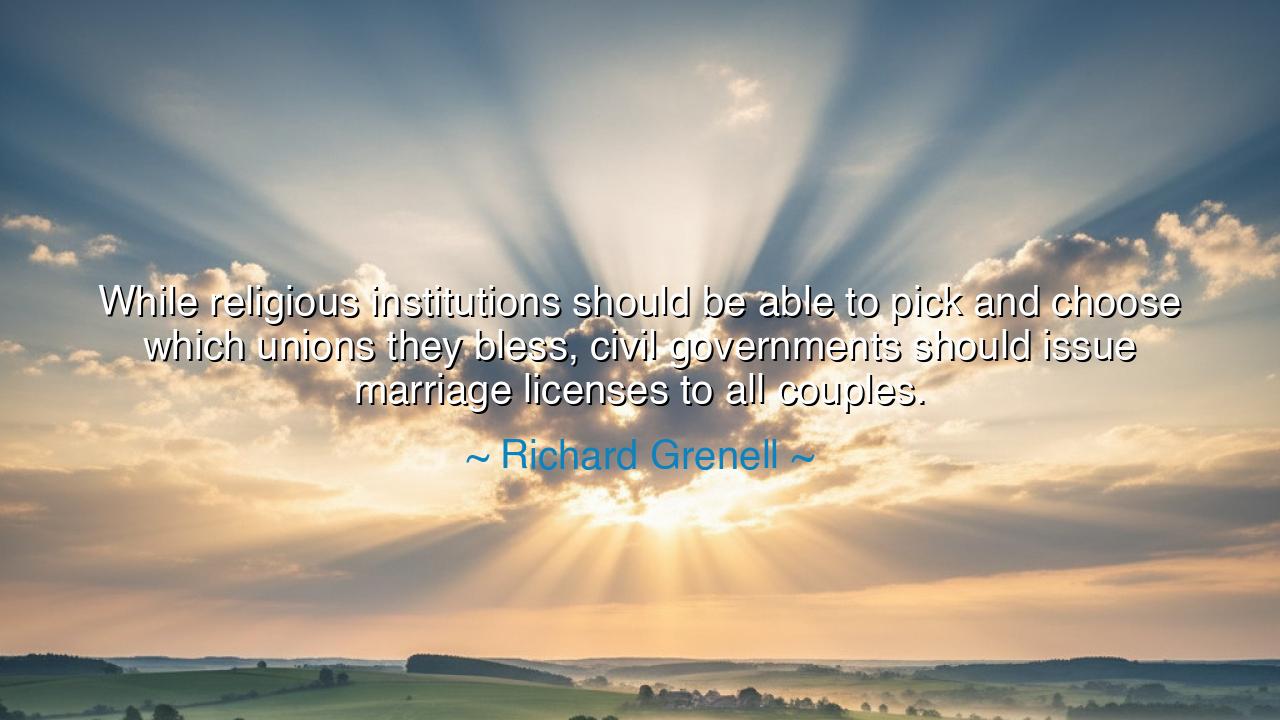
While religious institutions should be able to pick and choose
While religious institutions should be able to pick and choose which unions they bless, civil governments should issue marriage licenses to all couples.






In the calm and reasoned voice of Richard Grenell, a man who has walked both the corridors of power and the pathways of personal conviction, we hear a truth born from the tension between faith and freedom: “While religious institutions should be able to pick and choose which unions they bless, civil governments should issue marriage licenses to all couples.” These words, though modern in form, carry the echo of ancient balance—the eternal struggle to honor both conscience and equality. They remind us that a just society must learn to distinguish between the sacred and the civic, to allow the soul its devotion while ensuring that law serves every citizen with fairness.
The meaning of this quote lies in its call for harmony, not division. Grenell speaks to the heart of one of humanity’s enduring conflicts: the boundary between religious belief and civil responsibility. He does not seek to destroy faith, nor to diminish the power of religious tradition. Rather, he acknowledges that belief, by its nature, must remain free. A temple, a mosque, a church—these are places of worship, not arms of the state. But the state, in its duty, must extend its hand to all, for it governs not the soul, but the citizen. In this delicate balance lies the beauty of true freedom: that one may follow divine conviction without imposing it upon another’s life or love.
Grenell’s words also arise from a deep understanding of justice as inclusion. Civil government exists not to sanctify but to safeguard—to ensure that all are protected under the law’s impartial gaze. When he insists that marriage licenses should be granted “to all couples,” he speaks for those who have long stood outside the gates of recognition: those whose love did not fit the mold of tradition. He calls upon society to remember that equality is not the enemy of morality, but its truest expression. For as the ancients said, “A kingdom divided between gods and men must learn to honor both.”
History offers us the lesson of Loving v. Virginia, the 1967 case in which an interracial couple, Mildred and Richard Loving, stood before the highest court of the United States to defend their right to be wed. Theirs was not a fight against religion, but against injustice masquerading as order. They did not ask churches to bless their union—they asked their government to recognize it. And in their victory, they carved a new path for love under the law. Grenell’s words stand in that same lineage of liberation: a recognition that the state’s duty is to protect human dignity, not to define divine doctrine.
In a world often torn between belief and liberty, Grenell’s statement shines as a principle of peace. It does not demand that faith bend, nor that law bow, but that each respect its sphere. Religious institutions may preserve their traditions; the state must preserve equality. Such an arrangement is not weakness but wisdom—it ensures that the spirit remains free and that justice remains blind. For when religion governs the law, freedom dies; but when law silences faith, the soul withers. Only when both walk side by side, neither ruling the other, can a nation remain whole.
Yet, the quote also carries a challenge: it asks humanity to rise above fear. Many resist this balance, fearing that equality diminishes holiness. But Grenell’s insight reveals the opposite—that true faith has nothing to fear from freedom. The temple that must coerce belief is already crumbling; the love that must deny others is already impure. To honor both faith and fairness is to trust that truth stands firm without the need for force. In this way, compassion becomes the highest form of courage.
Therefore, O listener, let this lesson dwell in your heart: hold fast to your beliefs, but do not bind others with them. Let the sanctuary guide the soul, and let the state guard the citizen. Defend the right of every person to love and be loved beneath the law’s protection, even as you defend the right of the faithful to their sacred convictions. For this balance is not compromise—it is civilization.
And remember, as the ancients taught, that the measure of a just people is not in how they worship, but in how they treat those who worship differently. When faith and freedom are allowed to coexist, the world becomes not a battlefield, but a garden—where truth and love grow side by side, each nourished by the light of respect. Thus spoke Richard Grenell, and thus must we remember: to uphold equality is not to abandon belief, but to dignify both the human heart and the divine.






AAdministratorAdministrator
Welcome, honored guests. Please leave a comment, we will respond soon